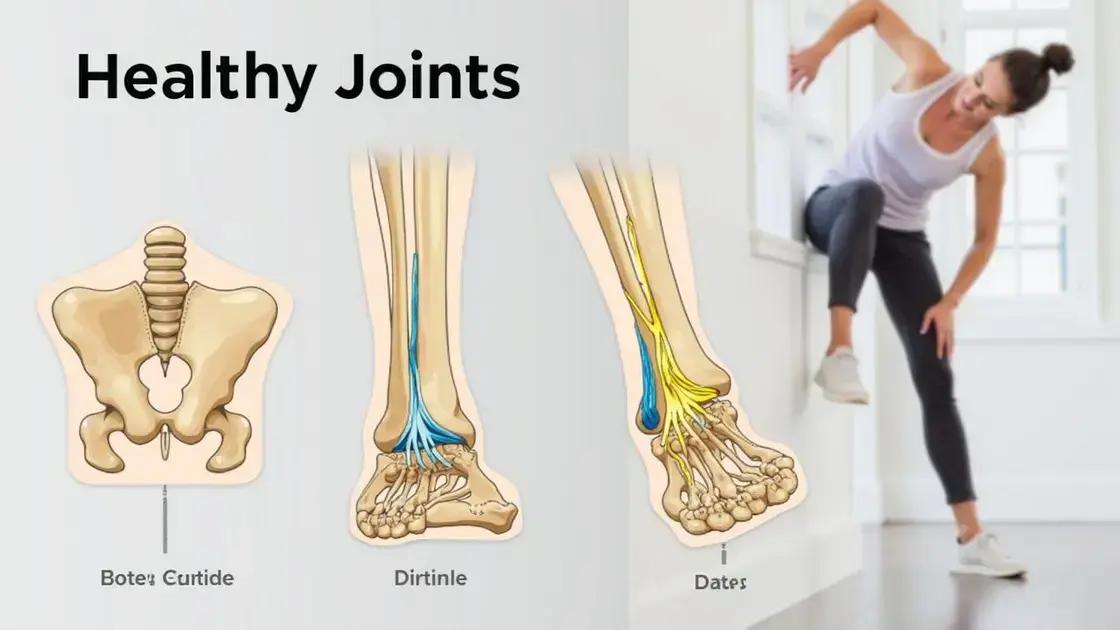Supporting joint health with supplements like glucosamine, chondroitin, and omega-3 fatty acids, along with maintaining a healthy lifestyle through proper diet, regular exercise, and hydration, can significantly improve flexibility and reduce discomfort.
Joint health is vital for maintaining an active lifestyle and overall well-being. As we age or engage in strenuous activities, our joints can experience wear and tear. Learning how to support joint health with supplements can make a significant difference in alleviating stiffness and discomfort. In this article, we will explore various supplements, their benefits, and tips to enhance your joint health naturally.
Understanding Joint Health and Its Importance

Joint health is crucial for enjoying a full and active life. Healthy joints allow us to move freely, engage in daily activities, and participate in our favorite sports. A well-functioning joint system is essential not just for movement, but also for maintaining overall health.
What Are Joints?
Joints are the places where two or more bones meet. They can be found throughout the body, including in the knees, elbows, hips, and spine. Joints provide stability and strength, allowing our bodies to perform various movements like bending, twisting, and rotating.
The Role of Cartilage
Cartilage is a smooth, rubbery tissue that covers the ends of bones at the joint. It acts as a cushion, reducing friction and absorbing shock during movements. As we age, cartilage can wear down, leading to pain and reduced mobility.
Common Joint Issues
Many people experience joint issues, such as arthritis, tendinitis, and bursitis. These conditions can cause inflammation, pain, and stiffness, making it difficult to perform everyday tasks. Understanding how to support joint health is vital, especially for those at risk of such conditions.
Why Care for Your Joints?
Taking care of your joints is essential for maintaining an active lifestyle. Good joint health helps prevent injuries and long-term damage. By prioritizing joint support, you can enjoy a more vigorous and fulfilling life.
Key Supplements for Joint Support

When it comes to supporting joint health, certain supplements have shown promising results in reducing pain and improving mobility. Here are some key supplements that can help:
Glucosamine
Glucosamine is a natural compound found in cartilage. It helps maintain joint structure and may reduce the pain of osteoarthritis. Many people take glucosamine sulfate to support their joint health, especially as they age.
Chondroitin
Chondroitin is often used in combination with glucosamine. It is also a component of cartilage and helps it retain water. This can improve joint flexibility and reduce pain.
Omega-3 Fatty Acids
Omega-3 fatty acids, commonly found in fish oil, can reduce inflammation in the body. This is particularly beneficial for joints affected by arthritis. Including omega-3s in your diet can contribute to overall joint health.
Tumeric
Tumeric contains curcumin, which is known for its anti-inflammatory properties. Many people take turmeric supplements to help support joint function and reduce pain and swelling.
Collagen
Collagen is a protein that helps build and maintain joint tissues. Taking collagen supplements may support joint functions and alleviate discomfort, especially in conditions like osteoarthritis.
Vitamin D
Vitamin D is crucial for bone health and helps the body absorb calcium. Ensuring adequate vitamin D levels supports overall joint health and can prevent pain.
Incorporating these supplements into your routine can provide significant benefits for joint health. However, always consult with a healthcare professional before starting any new supplement regimen.
Lifestyle Tips to Enhance Joint Health

Enhancing joint health is not just about supplements; your daily lifestyle choices play a large role too. Here are some valuable tips to help keep your joints healthy:
Stay Active
Regular exercise helps maintain joint flexibility and strengthens the muscles around the joints. Aim for low-impact activities like walking, swimming, or cycling to avoid excessive strain.
Maintain a Healthy Weight
Carrying extra weight puts additional stress on your joints, especially those in the knees and hips. Losing even a small number of pounds can significantly reduce the burden on your joints.
Practice Good Posture
Good posture helps maintain alignment in your joints. Whether you’re sitting or standing, keep your back straight and avoid slouching to reduce strain on your joints.
Incorporate Stretching
Stretching enhances flexibility and helps maintain a full range of motion. Simple stretches can be done daily to keep your joints limber and reduce stiffness.
Stay Hydrated
Drinking enough water is vital for joint health. Adequate hydration helps maintain the lubrication within your joints and prevents friction.
Eat a Balanced Diet
Your diet can affect your joint health. Focus on eating fruits, vegetables, lean proteins, and whole grains. Foods rich in antioxidants and omega-3 fatty acids are particularly beneficial.
Quit Smoking
Smoking can negatively impact your joint health. It reduces circulation and can lead to further complications. Quitting smoking can improve your overall health, including your joints.
Limit Alcohol Intake
Excessive alcohol can lead to dehydration and increase the risk of joint problems. It’s best to keep your alcohol consumption moderate.
By implementing these lifestyle tips, you can enhance your joint health and keep them functioning properly for years to come.
Conclusion: Maintaining Joint Well-being

Maintaining joint well-being is essential for a healthy and active life. By taking a proactive approach, you can support your joints effectively. Here are key points to remember:
Regular Monitoring
Keep an eye on any changes in your joint health. If you notice increased pain or stiffness, consult a healthcare professional promptly. Early intervention can prevent further damage.
Consistency is Key
Incorporating joint support supplements and lifestyle changes should be a consistent part of your routine. Determine a schedule that works for you and stick to it for the best results.
Stay Educated
Knowledge about joint health is empowering. Stay informed about new research, effective supplements, and lifestyle practices that promote joint well-being.
Holistic Approach
Combine supplements with healthy lifestyle choices. Ensure a balanced diet, stay hydrated, and engage in suitable physical activities to enhance overall joint health.
Seek Professional Guidance
Always consult healthcare professionals when considering supplements or making significant changes to your lifestyle. They can provide personalized advice based on your unique health needs.
By following these principles, you can maintain optimal joint health, allowing you to enjoy life to the fullest.
In Summary: Supporting Your Joint Health
Understanding how to support joint health with supplements and lifestyle changes is vital for maintaining mobility and comfort. Supplements like glucosamine, chondroitin, and omega-3 fatty acids can provide significant benefits, especially when combined with a healthy lifestyle.
Incorporating regular exercise, maintaining a healthy weight, and ensuring proper nutrition are essential steps to improve your joint well-being. Additionally, staying informed and seeking professional guidance can help you make the best choices for your health.
By prioritizing joint health today, you pave the way for a more active and enjoyable future. Take steps now to keep your joints healthy and functioning well, so you can continue doing what you love.
FAQ – Frequently Asked Questions about Joint Health
What are the best supplements for joint health?
Key supplements include glucosamine, chondroitin, omega-3 fatty acids, turmeric, and collagen, which can help reduce pain and support joint function.
How can lifestyle changes improve joint health?
Staying active, maintaining a healthy weight, practicing good posture, and incorporating stretching can all enhance joint flexibility and reduce discomfort.
Is it important to consult a healthcare professional before taking supplements?
Yes, consulting a healthcare professional ensures that you choose the right supplements for your specific health needs and avoid potential interactions.
How much water should I drink for optimal joint health?
Staying well-hydrated is important. Aim for at least 8 cups (64 ounces) of water daily to keep your joints properly lubricated.
What role does diet play in joint health?
A balanced diet rich in fruits, vegetables, lean proteins, and whole grains provides essential nutrients that support joint health.
Can weight loss benefit my joint health?
Yes, losing excess weight reduces stress on the joints, particularly the knees and hips, leading to less pain and improved mobility.













